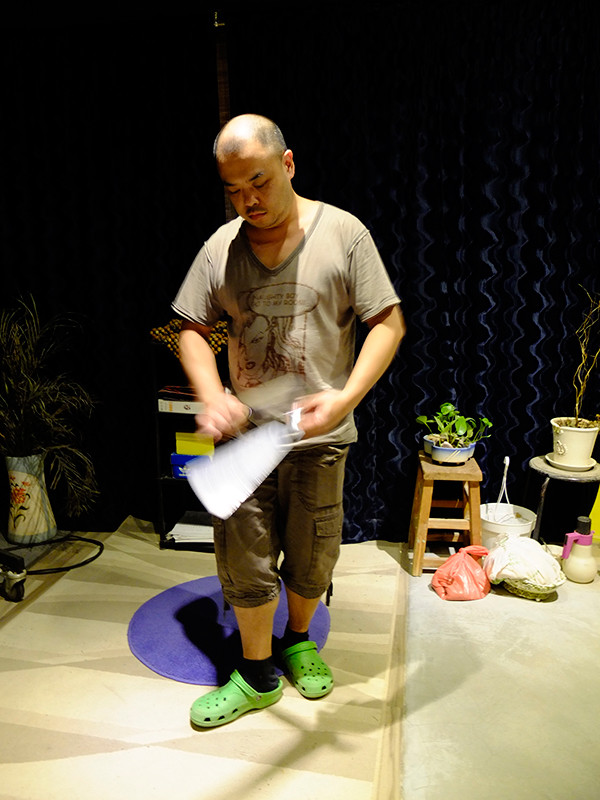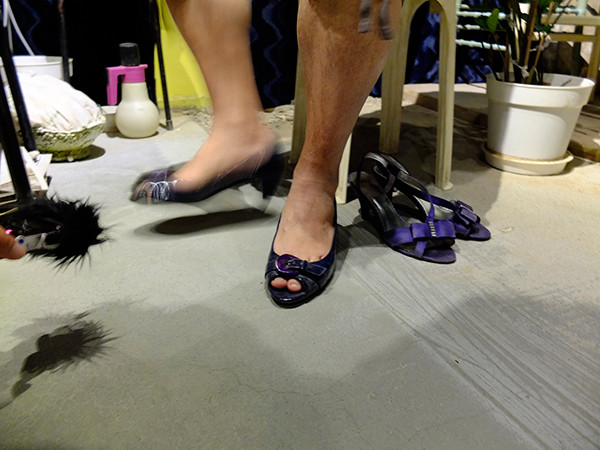Listen 來聽
The Legend of a Generation 一代行尊
Listen 來聽 / Meanderings - Feature Story 咫尺 - 專題故事 / Feature: Sound Professionals 聲音職人系列
Interview 採訪: Kwong Wing-ka, Law Yuk-mui/ 鄺永嘉、羅玉梅
Editing 編輯、整理: Law Yuk-mui/ 羅玉梅
English Translation 英譯: Daniel Ho Sze-hin/ 何思衍09/25/2012
Hong Kong/ 香港
footsteps, highheel, horse, sword, 刀劍, 馬步, 高根鞋

Yu Kah-luk (L) with his studio colleague (R)
Tomy Yu Ka-Luk, who entered the scene in the 1970s, has had many years of experience in film sound effects and mixing. He has participated in films such as The Legend of Zu, The Storm Warrios I & II, Infernal Affairs, Time and Tide, Perhaps Love, etc. Every time Tomy is asked to list the works he has been involved with, he invariably says, “Oh, there’re too many; I can’t remember.” His Foley studio has been called “one of the most organized studios in Hong Kong.” On the tip of his tongue are a whole bunch of older names and terms, earned through his long experience.
“Back then, after I was done with school, I didn’t have the faintest idea of what to do. Then I saw an ad for “recording sound work” at Shaw Brothers. They had never put up ads to hire people, and at first I just thought it was interesting. I didn’t think about the question of interest — it was just purely that I needed a job.”
-Tomy Yu
From the “King of Two Canes” to the “Four Heavenly Kings”
Tomy Yu (abbreviated to Yu below): I entered Shaw Brothers back in the 1970s, when the film industry was in a slump, and stayed there for about six or seven years. Once I had the chance to cover for someone at a TV station, and ended up being invited to join ATV (Hong Kong’s Asia Television). ATV at the time was the age of Tsui Siu-ming and the trend was to make historical dramas; with martial arts and sword sequences, a single scene could use up to a dozen weapons. On the set, I whipped a cane with all my strength, first with one hand and then with two hands; afterwards, I felt sore all over, as though I had beaten up or something. At the time, Tsui Siu-ming nicknamed me “King of Two Canes”.
At first, broadcast television had this part-time system, but as things started growing, they felt they needed to build a professional sound effects team. So they found the best technicians to form a sound effects crew. Ching Siu-tung’s brother, Ching Siu-long, also worked in this field. Back then we had the [1]“Four Heavenly Kings”; four people were responsible for the sound effects of the entire series. Back in the day, Foley and sound effects took place at the same time, so we had to know everything and be good at everything. Nowadays, things have been split up, with ambient sounds vs Foley
From Two Hands to Computers
Yu : A film of 90 minutes has about nine or ten acts of ten minutes each. Take a more relaxed drama: you had to split it into eight or ten segments, with thirty or forty seconds per segment. Once they yell “cut” everything has to start all over again, so you must have a great memory and a fast reaction! Back then, the vast majority of tasks had to be completed on set; since machinery couldn’t really help with much, most of the gun shots and car sounds were done right there. To record a sound track — whether it’s airplanes, cannons, or a volley of gun sounds — the most you could repeat was three times. The first and second times got you to 80-90%; the third time you made adjustments; and the fourth time, the sound was already “full”. It used to be really tough to make everything good and do things precisely; now you can record a hundred times if you want.
A hard disk with several GB used to cost several thousand dollars; now that would get you something with several TB (terabytes; 1 TB = 1000 GB) — just storage alone is completely different. An open reel used to cost 200 dollars — but how much would you have recorded? You couldn’t bear wasting anything! Recording used to be instantaneous and then that was that; you couldn’t improve on it. Whatever your reaction on the spot was it. Which was why some spots you really had to rush. Say you have a recording of 25 frames per second: being four frames slower is normal; being one or two frames slower is really incredible already — an excellent reaction. Back then, the cost was related to your manual skills, since no machine could replace you.
Turning Pennies into Gold
Yu: In principle, you need to watch the whole film in order to understand what the director is trying to express — and it’s not enough to watch it once! I look at the script once, and talk to the director about what he wanted; when you get down to doing it you have your own feelings, too, so nothing is completely cut off on its own. And if you manage to get something really complicated done in a simple and easy way, that was called “turning pennies into gold”. For instance, with an airplane crashing, I could use the sound of two metal rods striking one another, together with carefully arranged microphones, and I would have the sound. You need to know how to grasp the tricks within. A really good sound effect sounds like it walked right out of the image, in complete harmony with it. The best is when the sound effects don’t sound like effects!
There are so many sounds we have never experienced. Who has ever heard the sound of someone walking on the moon! In that case, I use a very muffled sound to express this sense of slowness and levity. Foley are more or less an art; there is no specific guide. All you have to do is to put your mind to it. Everyone’s level is different. If you do better than your colleagues, then you know you’re not doing too badly! This profession is all about others quietly recognizing your work; you can’t really yourself say whether you did well or not.
[1] “Four Heavenly Kings” refers to the four gods in Buddhism who looked after the cardinal directions of the wind (in Sanskrit, caturmaharaja).
70年代入行的余家祿先生具多年電影聲效及混音經驗,曾參與電影包括:《蜀山》、《風雲一、二》、《無間道》、《順流逆流》、《如果·愛》……等。每次請余生舉出曾經參與過的作品,他總是說:「不記得!太多了!」。余生的特殊音效室被行內人喻為「香港數一數二最整齊的工作室」。他的口總是滔出一堆堆復古的名詞,如「新藝城」、「麗聲戲院」、「斗零」與「大牛」。
「當年讀完書,『曚查查』見到邵氏兄弟(香港)有限公司登廣告請『錄音間工作』;邵氏從未試過登報請人,當初只是覺得有趣,並沒有考慮興趣的問題,純粹需要一份工作。」
– 余家祿
從雙鞭王到四大天王
余家祿(下簡稱余):我70年代進入邵氏,當時電影業漸漸低迷,大概做了六、七年。在一次做電視台替工的機遇下,被邀請加入亞州電視工作。那時候的亞視是徐小明年代,電視台流行拍古裝片;「武打」、「劍空」,一場戲動用到十多樣武器。我現場拿著籐條猛力抽,從單手練到雙手,回家後感覺全身痛,像被打了一身一樣!當時在亞視,徐小明封我為「雙鞭王」。
起初無線電視台是兼職制的,但隨著其規模漸漸擴大,他們覺得有需要建立一隊專業的聲效團隊。那便找了當時全香港最「精壯」的師父組成一隊聲效組。程小東的弟弟程小龍也是從事這個行業的。當年我們有四大天王[1] — 風、調、雨、順,四個人負責整套劇的聲效。從前特殊音效與聲效是同時進行的,所以什麼都要懂,基本上是全能的,而現在都分開來做,環境聲歸環境聲、特殊音效歸特殊音效。
從一雙手到電腦
一套九十分鐘的電影有九至十本戲,十分鐘一本。比如較輕鬆的文戲,剪十段八段聲帶,打戲幾十秒剪一段。如果一喊「停」所有東西都要重新開始,記性一定要好,反應一定要快!從前絕大部份的工作都需要現場完成,因為機器幫助不了多少,所有槍聲、車聲都是現場做的。從前錄一條聲帶,不論是飛機大砲、槍林彈雨,最多錄三次。第一、二次做到八九成,第三次作補充,第四次的聲音巳經很「㒼」。以前想做好,做得準確,也是很困難的,現在錄一百次都可以。以前一個幾吉位(GB)的硬盤約數千元,現在說的是太位(TB),單是在存檔這方面巳經很不同。以前一餅開盤式錄音二百多元,能錄到多少個小時?真是不捨得錄!以前錄音都是即時性,鎖死了,不能昇,臨場反應是那樣就是那樣。所以有些位是要搶的,以每秒25格的電影拍攝模式來說,慢四格是正常的;慢一兩格已經很厲害,反應很好。以前貴就貴在手藝,因為沒機器可代替你。
從斗零變大牛
原則上你需要看完整齣電影才能夠了解他想要表達的東西,看一次是不夠!我看一次劇本、導演講一次他的要求,到你真正做時也有自己的感覺,所有東西不是分開的。若果你能用一個很簡單的方法,把一件很麻煩的東西做到,那就是「斗令變大牛」。比如飛機墜落,可能我用兩支鐵敲擊的聲音,加上巧妙地安排麥可風的距離,就能做到。你需要懂得掌握箇中竅門,一個做得好的聲音,聽起來像是從畫面裡走出來的,與畫面是協調的!最高境界是配音不似配音!這世界有許多聲音我們都沒經驗過的。你聽過月球漫步的聲音嗎?那我就用一個很「沉」的聲音,來表現那種「慢」和「飄」。特殊音效這東西,或多或少是一種藝術,沒有準則,靠的是用心去做。一班人工作,每個人水平都不同。過了二師兄,再過大師兄的頭,你便知道自己算做得不錯了!這一行是別人默認你的工作,沒有自己說好或不好。

馬步聲 horse footsteps

刀劍 sword

高根鞋 highheel